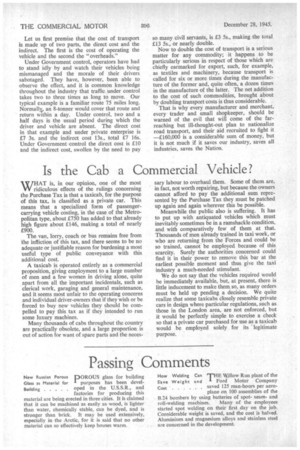Is the Cab a Commercial Vehicle?
Page 26

If you've noticed an error in this article please click here to report it so we can fix it.
WHAT is, in our opinion, one of the most ridiculous effects of the rulings concerning the Purchase Tax is that a taxicab, for the purpose of this tax, is classified as a private car. This means that a specialized form of passengercarrying vehicle costing, in the case of the Metropolitan type, about £750 has added to that already high figure about £146, making a total of nearly £900.
The van, lorry, coach or bus remains free from the infliction of this tax, and there seems to be no adequate or justifiable reason for burdening a most useful type of public conveyance with this additional cost.
A taxicab is operated entirely as a commercial proposition, giving employment to a large number of men and a few women in driving alone, quite apart from all the important incidentals, such as clerical work, garaging and general maintenance, and it seems most unfair to the operating concerns and individual driver-owners that if they wish or be forced to buy new vehicles they should be compelled to pay this tax as if they intended to run some luxury machines.
Many thousands of cabs throughout the country are practically obsolete, and a large proportion is out of action for want of spare parts and the neces sary labour to overhaul them. Some of them are, in fact, not worth repairing, but because the owners cannot afford to pay the additional sum represented by the Purchase Tax they must be patched up again and again wherever this be possible.
Meanwhile the public also is suffering. It has to put up with antiquated vehicles which must inevitably sometimes be in a ramshackle condition, and with comparatively few of them at that. Thousands of men already trained in taxi work, or who are returning from the Forces and could be so trained, cannot be employed because of this scarcity. Surely the authorities concerned could find it in their power to remove this bar at the earliest possible moment and thus give the taxi industry a much-needed stimulant.
We do not say that the vehicles required would be immediately available, but, at present, there is little inducement to make them so, as many orders must be held up pending a decision. We quite realize that some taxicabs closely resemble private cars in design where particular regulations, such as those in the London area, are not enforced, but it would be perfectly simple to exercise a check so that a private car purchased for use as a taxicab would be employed solely for its legitimate purpose.




































































